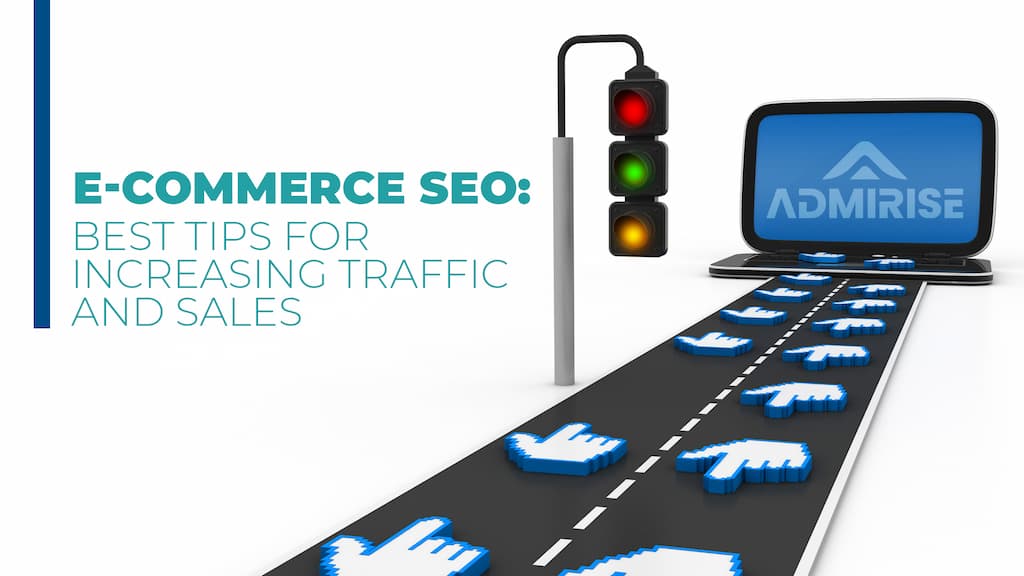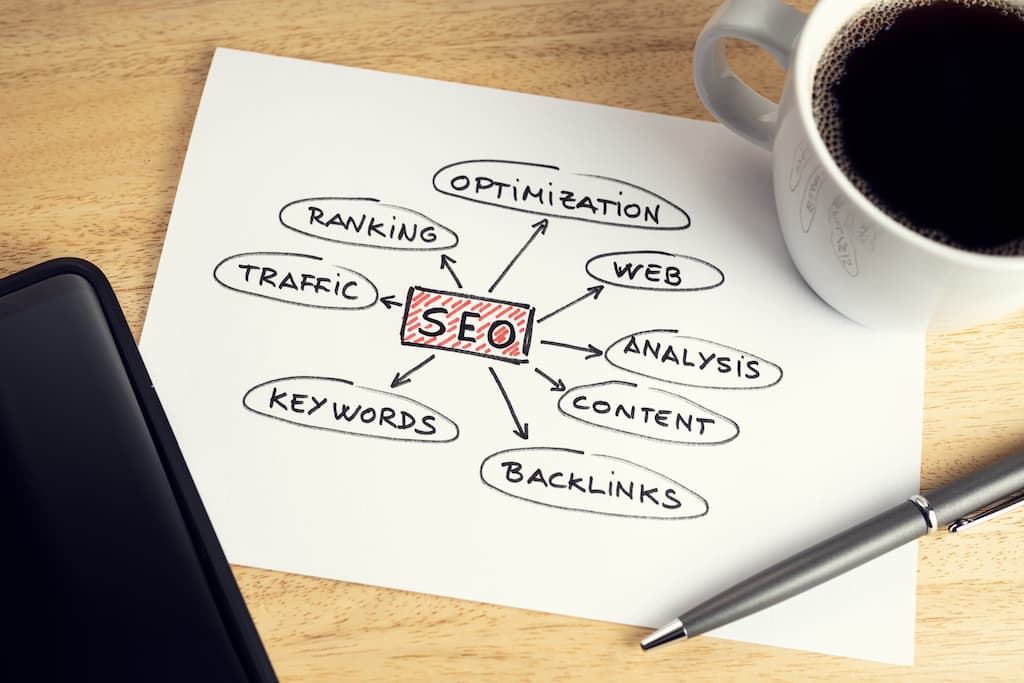
E-Commerce SEO: Best Tips for Increasing Traffic and Sales
May 17, 2023 in SEO, E-Commerce Solutions by Hami Uğur Aksakal
- What is E-Commerce SEO?
- Why is E-Commerce SEO Crucial?
- Best Tips For Increasing Traffic And Sales
- 1. Mobile-Friendliness
- 2. Finding The Best Keyword and Semantic Words
- 3. Create a Good Connection With Backlinks And Internal Links
- 4. Simplify Website Structure
- 5. Have Blogs in Your Website
- 6. Run an SEO Audit Regularly
- 7. Make Sure Your Website is Loading Fast
- 8. Optimizing Product Pages
- 9. Using Structured Data Markup
- 10. Leveraging User-Generated Content
- 11. Utilizing Social Media For SEO
- Final Say for a Better E-commerce SEO
What is E-Commerce SEO?
E-commerce SEO is a strategic process of optimizing your online store to achieve prominent visibility on popular search engines like Google, Bing, and Yandex. This optimization is crucial for ensuring that your website ranks well and captures the attention of millions of potential customers. By implementing effective and engaging SEO techniques, you can enhance the online presence of your website/shop and position it among the top search results, increasing its exposure to a vast audience. The significance of SEO in e-commerce cannot be overstated, as it acts as a powerful tool for maximizing your website’s reach and driving meaningful traffic to your online business.
Why is E-Commerce SEO Crucial?
The world of e-commerce SEO continues to grow exponentially in these modern times, with the number of people accessing the internet increasing quickly. With this growth and the competition getting more challenging, it becomes harder for your website to place itself on the first page of Google.
That’s where e-commerce SEO is effective, as it can help your online shop or website rank higher in the search engines, meaning that many people will see your brand/products/website on the first page of that particular search engine.

Best Tips For Increasing Traffic And Sales
There are several considerations that you can listen to make your brand more attractive to those search engines:
- Mobile-Friendliness
- Finding The Best Keyword
- Connection With Backlinks And Internal Links
- Simplify Website Structure
- Have Blogs on your Website
- Run An SEO Audit Regularly
- Make Sure Your Website Is Loading Fast

1. Mobile-Friendliness
Mobile phones have become equally, if not more, important than computers and are a primary tool for online searches. Also, according to a report by Hitwise, nearly 60 percent of all online searches are made on a mobile phone or a device.
So, with a proper mobile-friendly page, the chances of your website placing itself on the first page of the most significant search engines are much higher. If you want to check whether your website is mobile-friendly, Google Search Console (GSC) has a page called “Mobile-Friendly Test” where you can test your website.
2. Finding The Best Keyword and Semantic Words
Keyword-topic connection and harmony are among the most important issues for e-commerce SEO success because search engines connect specific keywords with specific topics; for example, if you want to create an online shop where you sell kitchen cabinets, using the keyword “kitchen cabinet” is essential if you wish to your shop to have a competitive e-commerce SEO score.
Keyword difficulty, search volume, and buyer intent information are three of the most important things you must look for before selecting the right keyword for your page.
Place your keywords strategically, and do not try to fill your website with them, as search engine bots may see your page as a scam. The meta title, The H1 headline of your page, the URL of the page you are working on, and the meta description are important places where you can use your keyword strategically.
Besides keywords, use different semantic words associated with the main keyword to make your page look as natural as possible for a successful e-commerce SEO.
While selecting the right keyword, make sure that that keyword has an excellent buyer intention score for more sales.
3. Create a Good Connection With Backlinks And Internal Links
Link building is essential for your website’s reputation; search engines like Google will give you more credit for those connections. Credible backlinks enhance your e-commerce SEO and earn your recognition and credibility from search engines. This credit and recognition will lead you to a successful e-commerce SEO and reward you with higher places in search results.
Backlinks serve as connections between different brands and websites, reflecting the trust and authority associated with your website. In other words, the more reputable brands and websites reference your website or specific pages, the stronger your SEO score becomes.
Equally, internal links contribute significantly to your website’s visibility because search engines evaluate your page and explore other internally linked pages relevant to the keywords. By leveraging internal links strategically, search engines recognize your website as highly relevant and deserving of more significant credit, improving its overall visibility for those keywords.
4. Simplify Website Structure
Just as how crucial topic-keyword harmony is, the page structure and the simplicity of the website are also crucial for Google and other search engines. If your website is too complicated for Google’s bots to navigate through and connect each blog/article with its keyword, the chances of your website having a good e-commerce SEO score are low. So, by ensuring that each page is simple enough and easy to navigate, you will enable search engine bots to do their jobs more efficiently and increase your website’s reliability.
5. Have Blogs in Your Website
Content is one of the most important things to succeed in SEO, as reliable, original, and helpful content will rank you higher in Google and other search engines. One of the best ways to create content is by writing blogs about various topics your website deals with.
Blogs will increase traffic and make you the authoritative website on that topic and keyword. And most importantly, they can get you backlinks from other websites, which will further help you get the traffic you want.
6. Run an SEO Audit Regularly
Once you have done everything on the list to ensure that your e-commerce SEO performance is optimum, one crucial thing to do is keep that momentum. Regular SEO audits allow you to see why and how your site gets low traffic and your website performance. For example, you can learn with these audits which pages are SEO-friendly and which are not by looking at your titles, meta descriptions, and hashtags.
7. Make Sure Your Website is Loading Fast
Page loading times are crucial if you want to draw traffic and do not want to lose any traffic due to inconveniences that can happen performance-wise. And one of the most critical contributors to loading times is the images on your website.
To ensure that the images on your website do not slow down the loading time and thus your e-commerce SEO, you need to choose the best file format. The most used image formats on the internet are JPEGs and PNGs due to their practicality. While JPEGs are way smaller than PNGs, they are better for images without any text or line drawings; however, if you want your image to contain text or drawings, PNGs are the best type of image you can choose.
You can also compress your images with free tools such as TinyPNG, ImageOptim, and ShortPixel. Using them can help substantially shorten your website’s loading time in the long run.
8. Optimizing Product Pages
An optimized product page is crucial to get the best place in the major search engines. Even if your products are better than the rest, if your customers start having problems connecting to the product page or there is an error with the page, it will affect your SEO profile and score poorly and impact the rank of your website.
9. Using Structured Data Markup
Structured data markup is crucial in today’s digital landscape, especially for e-commerce websites. By implementing structured data markup, businesses can provide search engines with valuable information, resulting in improved visibility and a better user experience. This markup enables the display of rich snippets offering detailed product information, driving more clicks and ultimately boosting conversions. Moreover, structured data markup allows websites to leverage specialized search features, increasing brand exposure and driving organic traffic. It also enhances digital marketing campaigns by ensuring accurate product information and enabling effective tracking and optimization. To stress out shortly, data markup is a vital component of e-commerce SEO, enhancing visibility, user experience, and conversions.
10. Leveraging User-Generated Content
Brand-specific content that is made by users is one of the best tools you can use to demonstrate the quality of your products. Not only will these make the quality of your business look more real, but also, content such as videos, texts, audio, or images will make your business level up in online marketing.
11. Utilizing Social Media For SEO
Social Media, along with Google itself, is the perfect gateway for you to promote your brand and business. Since people tend to use social media platforms as search engines, such as following hashtags, influencers, or buying products, utilizing social media is definitely an advantage for your desired traffic to your website.
12. Optimizing For Voice Search
Writing is not the only way for people to research brands on Google, and optimizing your webpage for voice search is one of the best as technology and search algorithms advance. People are acquiring and getting anything quickly; having an optimized website for voice search will give you the upper hand.

Final Say for a Better E-commerce SEO
The internet plays a significant role in promoting your brand within the expansive world of online marketing. In this highly competitive landscape, E-commerce SEO emerges as an essential tool for ensuring the success and visibility of your brand online. With ever-increasing competition, a comprehensive SEO strategy becomes paramount in driving the necessary traffic to your website.
A well-crafted e-commerce SEO strategy is no longer a choice but necessary in today’s marketplace. Brands that fail to embrace and capitalize on the power of SEO will inevitably lag behind their competitors, who have harnessed its potential. Beyond the increase in traffic, implementing an effective e-commerce SEO strategy enables you to achieve greater profitability and establish authoritative expertise in the specific commodities you offer.
By adopting a strategic and comprehensive approach to e-commerce SEO, your brand can secure higher rankings, garner increased organic traffic, and bolster your online authority. Embracing the principles of E-commerce SEO is an indispensable step towards thriving in the dynamic digital landscape and ensuring the long-term success of your brand.







